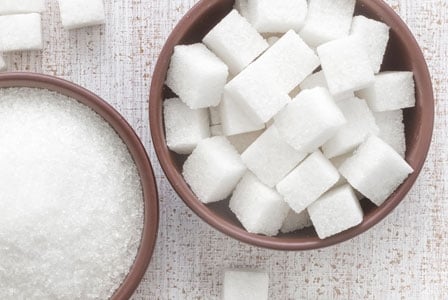
Sure, sugar has a bad reputation, but how bad is it really? Well you may be surprised.
When we were growing up, we were told sugar would rot our teeth and make us hyper. But now research is showing that it’s a bit more serious than just being empty calories—it can do some hefty damage to our health. Oh, and it’s everywhere!
1. It’s hiding everywhere
Yup, pretty much everywhere. For example, whole grain breads can contain about 3 grams of sugar per slice, and storebought pasta sauces can have about 6 grams or more per serving. Yikes! To best limit our added sugar intake (aiming for about 5 percent of our daily caloric intake, or about 25 grams), we should become savvy label readers.
2. We’re addicted
Remember how we’re supposed to aim for about 5 percent (or less!) of our daily caloric intake from added sugars? Well, Canadians are consuming about 21.4 percent. Gulp. Plus, recent research has found that sweet flavours can produce addictive-like behaviours, promoting changes in the reward system of the brain that help to drive overconsumption.
3. It has surprising health consequences
Some of the health consequences of too much sugar aren’t overly surprising, such as obesity, cancer, diabetes, and heart disease. However, you may not know that too much sugar can also lead to fatty liver disease (no matter your weight) and even damaged memory.
4. There’s plenty you can do without sugar
Thankfully, there’s a simple solution: limit added sugars. Try these naturally sweetened desserts by recipe developer and writer Jennifer Danter to get started. Read labels, shop the perimeter of the grocery store to find unprocessed, whole foods, and choose unsweetened versions of foods.
5. Artificial sweeteners are no better
But don’t fall for artificial sweeteners! New research is showing that consumption of non-nutritive sweeteners may promote weight gain, as well as diabetes. Your best bet? Stay away from artificial chemicals, and limit added sugars.

